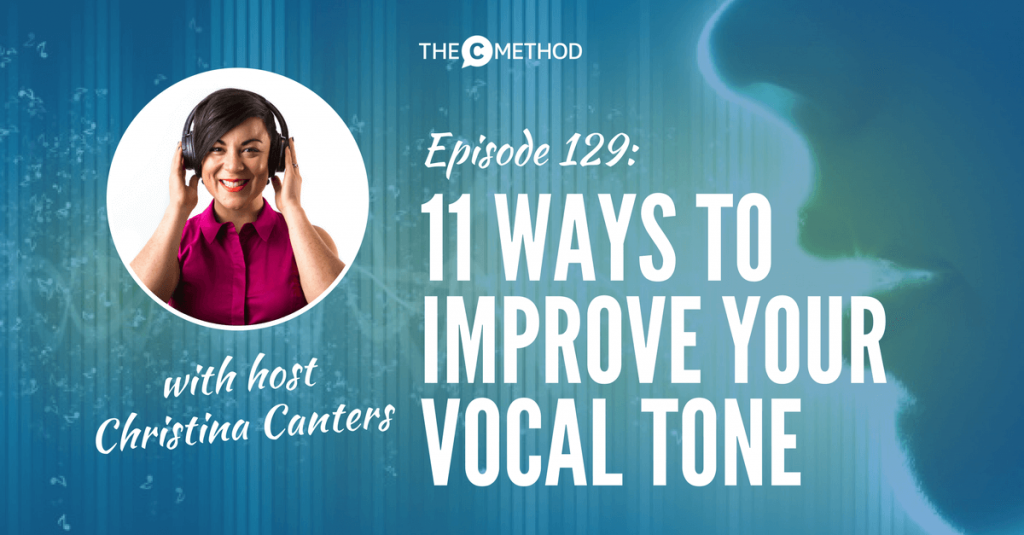
Your voice is the single most powerful communication tool you have!
In this episode, you’ll learn 11 powerful ways to effectively use your voice and improve your vocal tone to create a beautiful sound that projects confidence, authority, presence and influence.
This episode is based on the workshop I ran at Podcast Movement in August. It was VERY interactive and hands-on, so a pure recording wouldn’t have made sense here.
Why is vocal tone important?
Your voice had the power to communicate your confidence and authority. It can help you sound like a credible expert, and help you to influence and make a bigger impact on your audience. And this doesn’t just relate to podcasting! It can also be applied to your day-to-day work conversations, your presentations, and event with your kids.
Think of your body as an instrument, let’s say, a guitar. If you bent the neck of the guitar, it would make a pretty awful sound, right? In much the same way, if our bodies are tense, twisted and constricted, it will have a negative impact on the way we sound. So we need to treat our body like an instrument, and learn how to ‘play’ it properly, in order to create the most beautiful, luscious sound possible!
I want to give a shout out to my talented vocal coach friends Kimberley Smith from Inspired to Sing (who I interviewed in Episode 81: Your Voice is Good Enough) and Emmanuella Grace from Find Your Voice (who I interviewed in Episode 124: How to improve your speaking voice for more impact), for teaching me many of the vocal techniques and tools I share in this podcast.
11 ways to improve your vocal tone:
- Breath from your diaphragm – take a deep breath into your belly, not your chest.
- Open your mouth – if you want to project and be heard, you need to open your mouth. It sounds simple, but many people do not practice this.
- Blow bubbles – this is a great exercise to practice sustaining your breath when you speak.
- Ground yourself – squeeze your muscles or sit on your hands. When you’re physically connected, you come from a much more stable base from which to speak. Your voice, as a result, will sound more confident and grounded.
- Play with your vocal range by singing in the shower – yes, you read correctly!
- Go up the stairs and down the stairs – read a poem or piece of prose. Start low, and then go high with your voice, then go low again. This is great for people who speak very monotone – adding more vocal range helps you to be more engaging and interesting to listen to.
- Go fast and slow – similar to the exercise above. Practice reading something reallyfastwithouttakingabreak…and then. Slow it. Right. Down.
- Use your hands – I find that when I gesticulate with my hands, I come across more energetic. If you naturally don’t gesticulate a lot, that’s ok. Instead, focus on relaxing your body.
- Play with resonance. Low resonance makes us sound a bit more nasally (it’s the ‘a’ sound in ‘cat’). It’s great for cutting through noise and getting people’s attention. High resonance is more rounded (think a British accent), which makes us sound warmer, comforting and approachable.
- Cape, crown and headlights – a NIDA trick I learned many years ago. Listen to the episode as I take you through the exercise!
- Believe your voice deserves to be heard. Yes, your mindset is so important for tying all of this together. If you want to build your self confidence and self worth, and be more effective at talking about yourself, join me free Small Talk Made Simple class by signing up below or clicking here.
Hi Christina, I always love your podcast.
But I have a question, sometimes when I practice breathing when I was tired or stress it’s quite hard to breathe from diaphragm. Do you have any tips besides I need to relax myself first?
Thanks.
Hi Sarah, thanks for stopping by! So great you’re practicing your breathing. If you’re stressed or tired and finding it hard to relax, you may like to do some movement. For example, go for a brisk walk, jump up and down on the spot, or (my favourite) put on one of your favourite songs and dance around. This will help you to loosen up and hopefully breathe a little easier! I hope that helps! Let me know how you go 🙂
Hi christina i just want to say that yr methods are great but i have one question.
When i sing at home i sound great but when i sing at school my voice sounds terrible i think its because i am nervous so the question is how can i not be nervous . I read all the things ppl say before but when i tryed it ,it didnt work.Dou have any method or tips that i can try?
Hi Fazila, thanks for stopping by! I have a couple of podcasts about reducing nerves an anxiety, I suggest you have a listen 🙂 https://thecmethod.com/podcast/standoutgetnoticed/managing-fear-nerves-anxiety-public-speaking-public-speaking-mini-course-pt-3/ and https://thecmethod.com/podcast/standoutgetnoticed/deal-anxiety-stop-struggle/. Have a listen and implement what you learn, and I’d love to hear how you go!